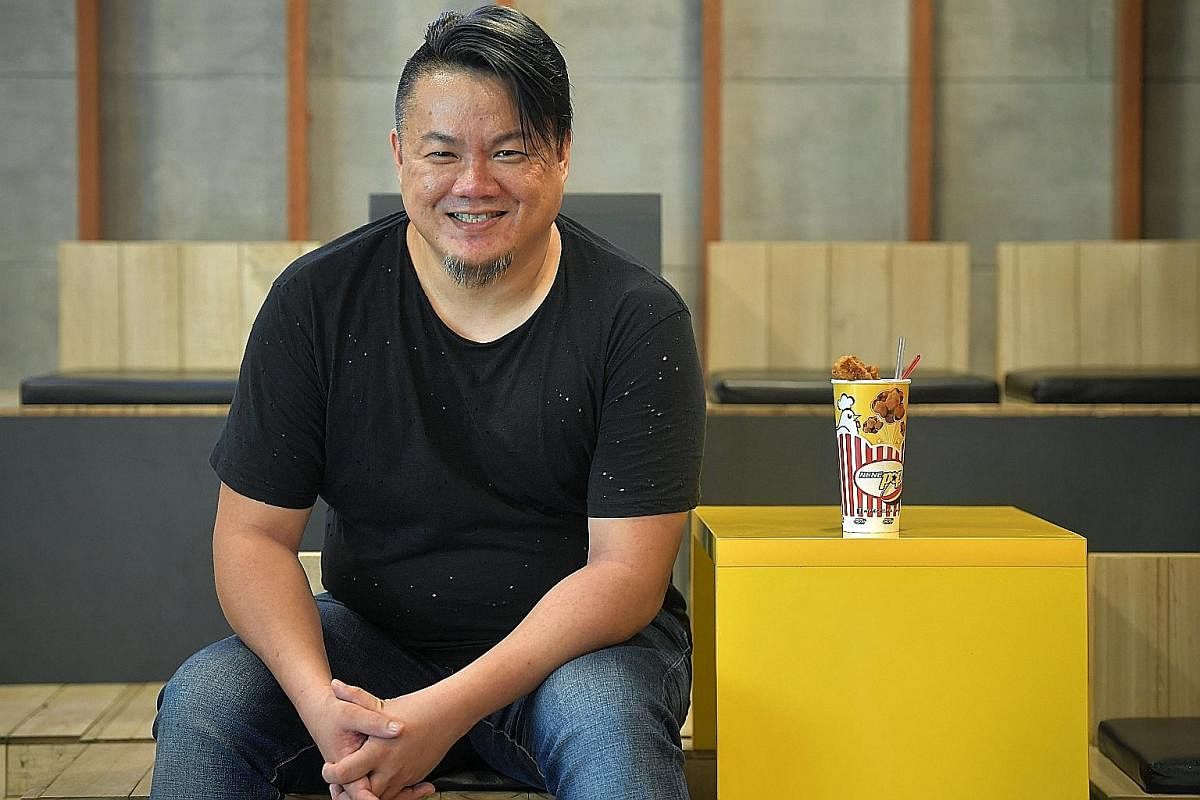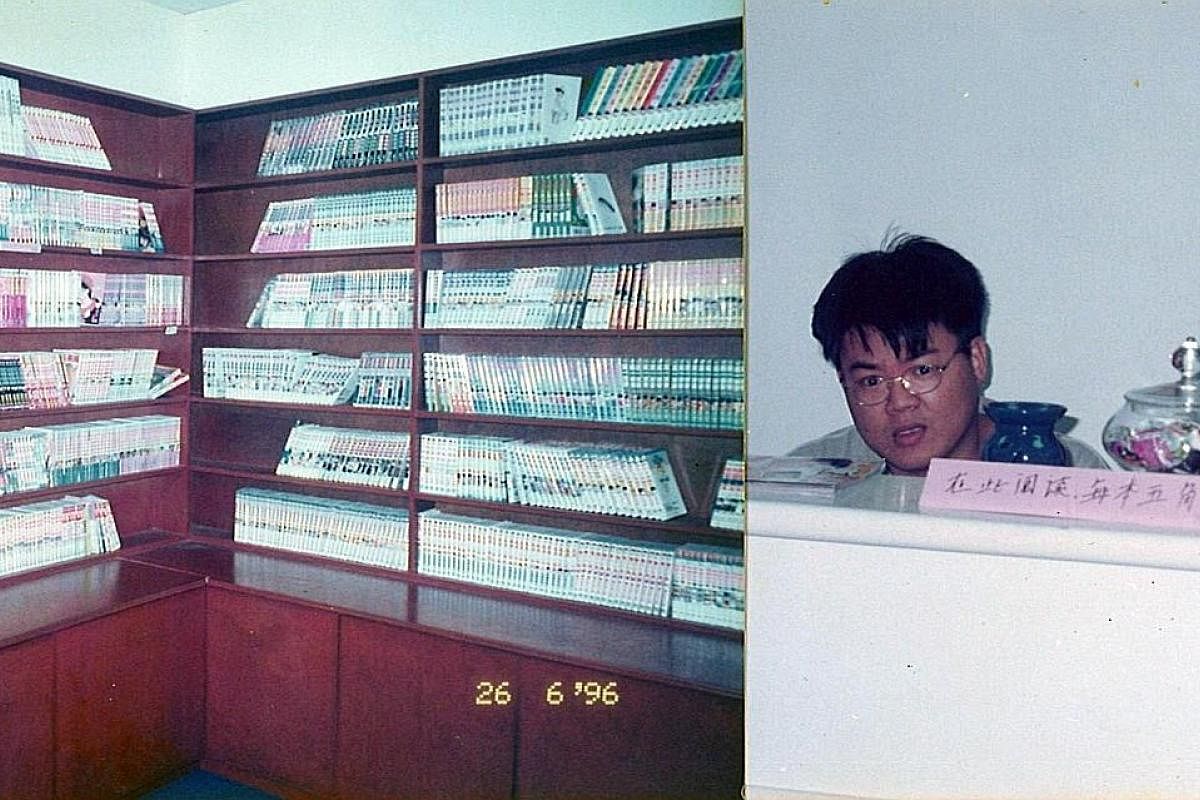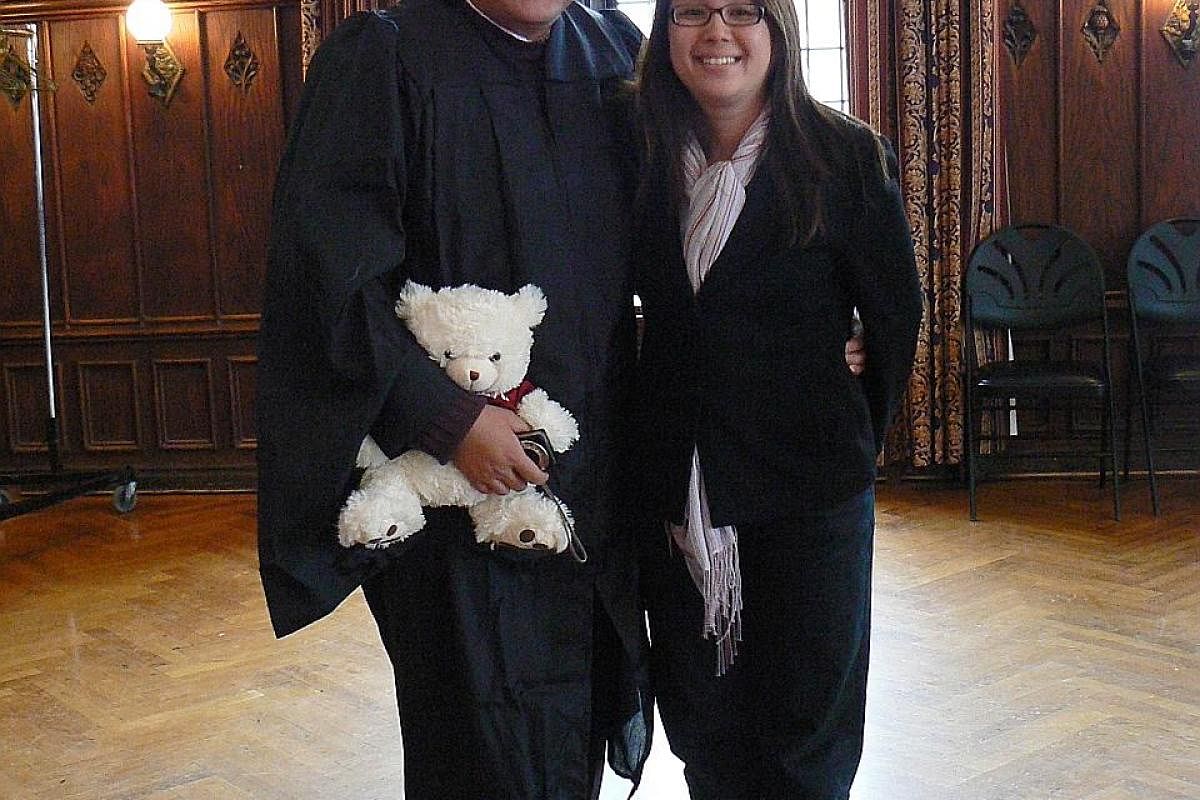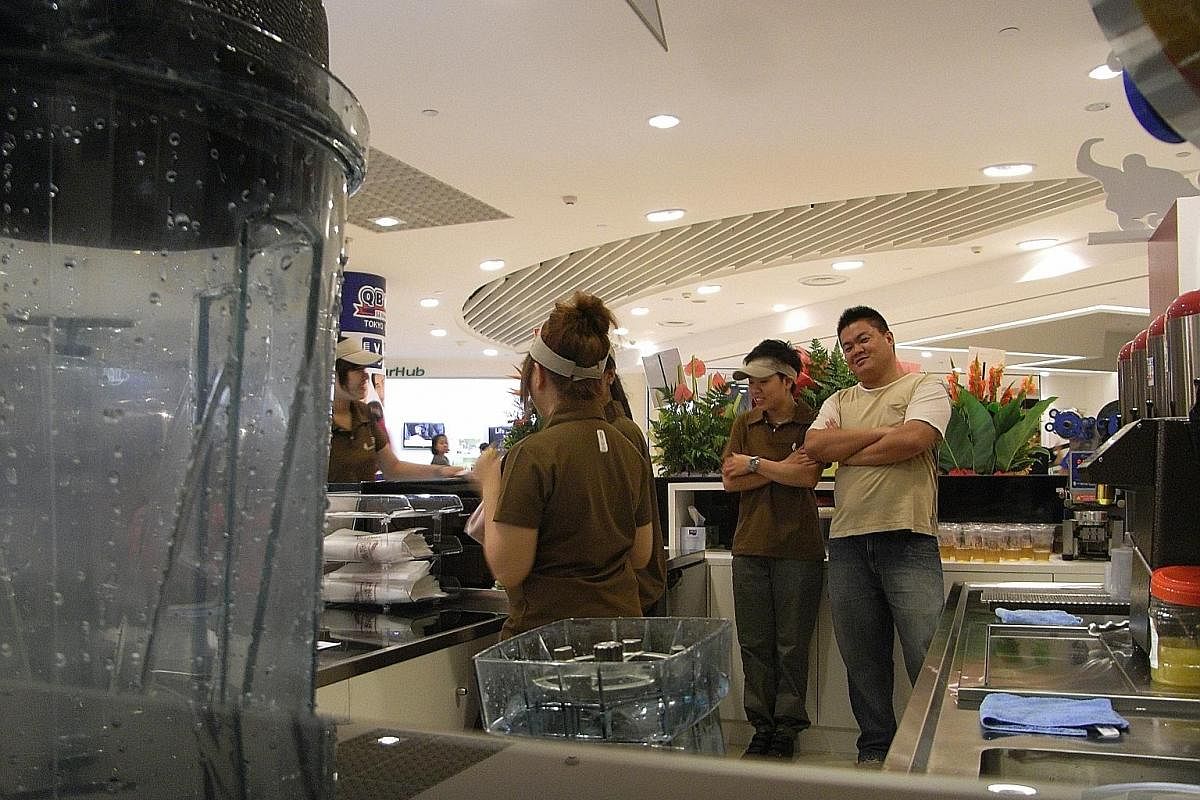The Life Interview with Rodney Tang: LiHO boss sold his flat to start first Gong Cha outlet
Former Gong Cha franchise owner Rodney Tang did not let a failed deal stop him, but turned 84 bubble tea outlets into his home-grown label, LiHO




Eager for The Straits Times to try his favourite drink, Busy Bee Guan Yin tea, Mr Rodney Tang - the managing director of RTG Holdings, which owns local bubble tea chain LiHO - strides purposefully to an outlet at Nex mall to place his special order. On the menu, it says Busy Bee Green Tea, but the tea can be changed with an additional 10 cents, he says.
It looks like he pays for the drinks, but then you dismiss the thought immediately.
A few minutes later, the staff at the counter politely calls out: "Excuse me, sir, would you like a bag (for the drink)?" It turns out that he did pay - and he was not recognised.
"That's great, I'm very low-key," he says with a chuckle. At this reporter's suggestion that he can be on reality television show Undercover Boss, he says: "I don't need to. I am undercover all the time."
Indeed, Mr Tang, 46, comes for this interview at Nene Chicken in Nex - also a brand under RTG Holdings - in a T-shirt which seems to be patterned with holes, jeans and sandals. Not exactly the usual boss attire.
He keeps a low profile, preferring instead to work hard behind the scenes of his growing food and beverage empire.
There was no escaping the spotlight, though, over the exit of well-loved bubble tea chain Gong Cha, which he had brought in 2009, from Singapore. Under him, Gong Cha earned $30 million in revenue annually.
The parent company, Royal Tea Taiwan, had sold the business to Gong Cha Korea, which is owned by Japanese private equity firm Unison Capital.
Instead of folding the business after a new deal failed to be concluded, he transformed all 84 outlets into his new home-grown label LiHO, which means "how are you" in Hokkien. The whole process, to roll out new signage and branding across the outlets, cost about $1 million. The overhaul extended to getting a new tea supplier and changing the cup's look and feel as well.
LiHO's launch on May 29 faced a wave of scepticism over its new cheese tea offerings and it had only a limited supply within the early weeks of the rebranding.
But according to Mr Tang, sales are "better than before" and he remains confident about its future as he has already received franchising inquiries from Canada, Hong Kong and Vietnam.
Other brands under the group include Korean barbecue chain Bornga; Paik's Bibim, which specialises in bibimbap (Korean mixed rice); cafe chain Paik's Coffee; Tino's Pizza Cafe; and Woo Ricebox, serving Taiwan-style bentos.
Born in Brunei to parents who ran a now-defunct coffee shop, Mr Tang - a Singapore permanent resident - always had an entrepreneurial streak. Growing up, he would help them collect payment for food as well as bus tables.
The electrical engineering graduate from Monash University in Australia also worked part-time for four years at a bread factory. He says in a mix of Mandarin and English: "The job was flexible and I got to take bread home. Back then, I had no idea what I wanted to do while everyone was going for job interviews."
So he returned to Brunei and set up a comic-book shop selling used and new books in 1996, stocked with his personal collection of about 5,000 titles.
In the same year, he got a job at telecommunications company AT&T as a technician. In four years, he worked his way up to a project manager position and was then sent to Vietnam for a year as country manager.
He sold his flat to start first Gong Cha outlet
A subsequent opportunity to head to China under the company did not pan out, so he came to Singapore in 2001 as a senior project manager with multinational communications and information technology company Nokia.
"Maybe if I had gone to China, I would be Alibaba," he quips, referring to the success Mr Jack Ma has had with his e-commerce platform.
Mr Tang spent about 10 years with Nokia, holding various positions from product manager to pricing manager.
A turning point came in 2006, when he spent $150,000 of his savings on his masters of business administration (MBA) at The University of Chicago Booth School of Business.
He recalls a piece of advice he took to heart: "A teacher said that if you don't change your career path in two years after graduating, your ROI (return on investment) is zero. It's not necessarily about getting a better job, but the keyword is 'change'. At least, I need to earn back my savings."
So he made it his mission to transform his career. During a holiday in Hong Kong with his wife Janice Tang, 42, in 2009, he noticed people queueing for Gong Cha's signature milk alisan tea.
Curious about the layer of milk foam on top, he figured it would be something different to bring into Singapore.
Credit goes to Mrs Tang, whom he has known since his secondary school days in Brunei, as she was the one who made the cold call to Gong Cha Taiwan.
Things moved swiftly from there. They met the founders in Taiwan and he says: "They were very happy to have us bring the franchise to Singapore because they were a small player back then. Maybe we were the only ones who met them? Or it could be just the right timing.
"I'm rather lazy. For all our brands, we've never explored a second option."
After the euphoria of the deal came the "painful" reality. No mall was interested in them as there were already players such as Koi, Each A Cup and Sweet Talk.
And to his horror, he realised that he did not have sufficient funds to proceed with the venture.
He bit the bullet and sold his four-room Housing Board flat for just over $400,000, the sum he required. The couple, who have been married for 14 years and have no children, now live in a four-room apartment in an executive condominium in Jurong West.
His first Gong Cha outlet, now defunct, was set up in 2009 at City Square - the only space available to him. It made a paltry $50 on its first day from selling just 20 cups. But people soon took note, especially those who were already familiar with the brand.
He broke even within a month and, within the first year, the chain grew to 13 stalls. One of the top-performing outlets is at Marina Bay Sands.
Both Mr Tang and his wife still had their full-time jobs and they would go to the outlet after work. Should the venture fail, they would still have a "safety net".
He quit his job after two years to go full-time into driving the business and bringing in more franchises.
Mr Thomas Tan, 41, who runs an investment company, has been friends with Mr Tang since their MBA days.
He says in Mandarin: "It sounds simple when he talks about it, but it takes a lot for someone to sell his house to start a business.
"I'm not surprised he went into the food business because I remember during our school days, we'd always go out to eat at different places. He would tell me why a concept was good or bad and how he would change it."
The conversion of Gong Cha outlets to LiHO kiosks has been quite a remarkable change and he is not quite done yet. Over the next three years, the outlets will be renovated to include elements such as mobile phone charging points.
Mr Tang's engineering background comes to the fore when he waxes lyrical about the improved LiHO cup, which he says is triple the previous version's cost. From his experience with Nokia, he says: "The feel and touch of the product is very important. Our new cup feels more solid. Now, we are selling an experience, a feeling. It's not just a beverage."
He is also looking at ways to make the cup reusable and customisable, and does not rule out doing delivery, operating vending machines or setting up a central kitchen.
So with the impending return of Gong Cha, supposedly by the end of this year, does he have a game plan? He says: "It's expected, so why worry?"
Nevertheless, he has done his homework and points out that the new Gong Cha in Korea looks like a chic Korean-style cafe. His prediction is that its return will prove to be more of a competition to cafe chains such as Starbucks rather than his "small kiosks".
Elaborating on a previous report by The Straits Times that he felt "betrayed" when he was not informed of the sale to Gong Cha Korea, he says he never got to meet the founders whom he had known from the beginning.
He adds: "I would have never reconsidered for a second if the founder was still there. I had asked to continue for another 25 years, which proves my sincerity, but then they came back to me with a much shorter period and with a lot of additional conditions.
"I respect their decision because without their support, we wouldn't have had today."
It is this passionate and personal investment in his brands that is Mr Tang's modus operandi.
For example, the decision to bring in the Bornga franchise was based on recommendations by friends. And he turned a chance meeting with the Nene Chicken founder into a business opportunity.
He says: "To me, a franchise is not just a franchise. I need to have personal access to the founder. If I don't know the founder and his philosophy, I won't work with him."
As for the offers to take LiHO overseas, he says: "I want a long-term alliance. I'm not just selling my brand. I want to build a global network."
With the introduction of the LiHO brand, he is looking to set up more of his own concepts while continuing to bring in franchises.
His elder sister, aged 49, helps out with Woo Ricebox at Republic Plaza. His 40-year-old younger sister, as well as his parents, who are in their late 60s, still live in Brunei.
He spends the earlier half of his day in the office at Henderson Industrial Park before making his rounds of his outlets. His wife handles the financial and human resources aspects of the company. They have 40 staff members in the office and 700 across the kiosks, including part-timers.
Mrs Tang says of her husband: "He likes new challenges. He can't sit still. He can be aggressive and has a bad temper. But he has mellowed over the years."
He may have mellowed, but his business instinct remains sharp.
At one point, he had considered doing LiHO while still franchising Gong Cha. He says: "But I know I can't do both. I have to focus on our capabilities. Yes, it's scary and it's not easy. I just don't think so much."
•Follow Eunice Quek on Twitter @STEuniceQ
Join ST's Telegram channel and get the latest breaking news delivered to you.
A version of this article appeared in the print edition of The Straits Times on July 10, 2017, with the headline The Life Interview with Rodney Tang: LiHO boss sold his flat to start first Gong Cha outlet. Subscribe

